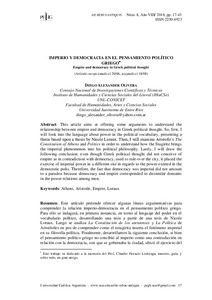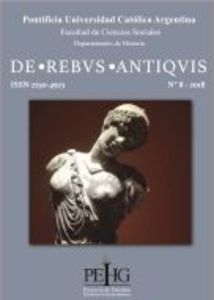Please use this identifier to cite or link to this item:
https://repositorio.uca.edu.ar/handle/123456789/9168| Título: | Imperio y democracia en el pensamiento político griego Empire and democracy in Greek political thought |
Autor: | Olivera, Diego Alexander | Palabras clave: | IMPERIOS; Aristóteles, 384-322 a.C.; DEMOCRACIA; FILOSOFIA POLITICA; HISTORIA DE GRECIA | Fecha de publicación: | 2018 | Editorial: | Universidad Católica Argentina. Facultad de Ciencias Sociales. Departamento de Historia | Cita: | Olivera, D. A. Imperio y democracia en el pensamiento político griego. [en línea]. De Rebus Antiquis. 2018, 8, (8). Disponible en: https://repositorio.uca.edu.ar/handle/123456789/9168 | Resumen: | Abstract: This article aims at offering some arguments to understand the relationship between empire and democracy in Greek political thought. So, first, I will look into the language about power in the political vocabulary, presenting a thesis based upon a thesis by Nicole Loraux. Then, I will examine Aristotle’s The Constitution of Athens and Politics in order to understand how the Stagirite brings the imperial phenomenon into his political philosophy. Lastly, I will draw the following conclusion: even though Greek political thought did not conceive of empire as in contradiction with democracy, used to rule over the city, it placed the exercise of imperial power in a different site in regards to the power exerted in the democratic polis. Therefore, the fact that democracy was imperial did not amount to a paradox because democracy and empire corresponded to dissimilar domains in the power relations among men. Resumen: Este artículo pretende ofrecer algunas líneas argumentativas para comprender la relación imperio-democracia en el pensamiento político griego. Para ello se indagará, en primera instancia, en torno al lenguaje del poder en el vocabulario político, desarrollando una tesis a partir de una tesis de Nicole Loraux. Luego se analiza La Constitución de los atenienses y La Política de Aristóteles en pos de comprender como el estagirita inserta el fenómeno imperial en su filosofía política. Finalmente, desarrollamos la siguiente conclusión, si bien el pensamiento político griego no concibió al imperio como una contradicción en relación con la democracia, con que se gobernaba la ciudad, ubicó el ejercicio del poder imperial en un lugar diferente al poder ejercido en la polis democrática. Por tanto, el hecho de que una democracia fuera imperial no constituía una paradoja porque democracia e imperio correspondían a dos instancias disímiles en las relaciones de poder entre los hombres. |
Cobertura Espacial: | ATENAS | URI: | https://repositorio.uca.edu.ar/handle/123456789/9168 | ISSN: | 2250-4923 | Disciplina: | HISTORIA | Derechos: | Acceso abierto | Fuente: | De Rebus Antiquis, 8 (8), 2018 |
| Appears in Collections: | DRA - 2018 nro. 8 |
Files in This Item:
| File | Description | Size | Format | |
|---|---|---|---|---|
| imperio-democracia-pensamiento-politico.pdf | 340,64 kB | Adobe PDF |  View/Open | |
| de-rebus-antiquis8.jpg | 20,96 kB | JPEG |  View/Open |
Page view(s)
662
checked on Feb 18, 2026
Download(s)
4,198
checked on Feb 18, 2026
Google ScholarTM
Check
This item is licensed under a Creative Commons License

